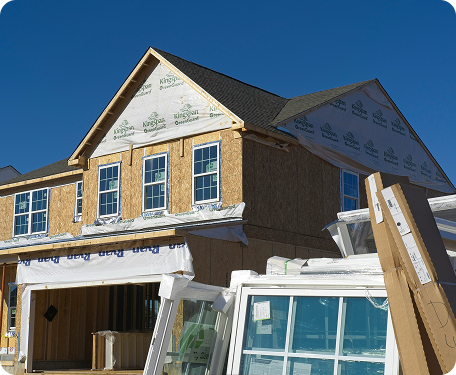Plumbing Insurance Specialists: Same Day Coverage


Get tailored and hassle-free plumbing insurance with ContractorNerd


CONTRACTOR-SPECIALIST INSURANCE PROVIDERS








We cover what matters on the job.
Most insurance agents have no clue what plumbers actually deal with. We do. Plumber insurance is what we do, so we know the headaches, the risks, and what really matters on the job site.
Plumber Insurance, Remodeled
Plumber insurance is essential, yet many business owners struggle to find plumber insurance tailored for their needs. No more. At ContractorNerd, we’ve built a proprietary quote platform specifically designed for plumbing contractors like you.

Faster, Simpler, Better
As trades-only specialists who focus exclusively on plumbers, we’ve rebuilt the entire insurance experience from the ground up to be faster, simpler, and more effective.

Compare in one place
Our technology connects directly with insurers who know the difference between residential service calls and commercial rough-ins, while our team of tech-enabled specialists guides you through coverage decisions that actually matter for your work.

Solutions for Any Size
Whether you’re running solo service calls or managing crews across multiple job sites, our platform delivers exactly what you need without the runaround of traditional insurance.
What Is Plumber Insurance?
ContractorNerd has done research to bring you a clear picture of insurance requirements and needs across the United States. Our analysis of over 900 plumber insurance quotes across all 50 states provides unprecedented transparency on what coverage you need and current market rates.
Key Takeaways
- Plumber Insurance, Remodeled
- What Is Plumber Insurance?
- What Plumber Insurance Do You Need?
- Plumber General Liability Insurance Coverage
- How Much Does Plumber Insurance Cost?
- Plumber Workers Comp Insurance Requirements
- Insurance For Plumbing Business That Expands Into Other Trades
- Additional Plumber Insurance Coverage Options
What Plumber Insurance Do You Need?
For plumbers, securing the right coverage is crucial and needs change based on the size and stage of your business. Here’s a guideline:
For Solo Plumbers
1-3 Employees
For Small Plumbing Businesses
5+ Employees
For Established Plumbing Businesses
Essential Coverage
Plumbers Liability Insurance (General Liability)
Your foundation for handling property damage and injury claims. This is what homeowners and GCs expect when they ask about your insurance.
Ongoing Operations
Protects you when things go wrong while you’re on the clock
Completed Operations
Handles problems that show up days or weeks later, like a failed joint flooding a basement or a poorly sealed connection damaging drywall
Contractor License Bonds
Most states won’t issue your plumbing license without one. Buy them for 3 years at a time to lock in lower rates and avoid scrambling during renewal season.
Recommended Additional Coverage
Tools and Equipment Coverage (Inland Marine)
Covers everything from your pipe threaders to diagnostic cameras when they’re stolen from your truck or damaged on site
Contractor’s Errors & Omissions
Steps in when customers claim your work was done wrong or a fixture you installed failed prematurely
Commercial Auto
Personal auto policies won’t cover accidents when you’re hauling tools and materials to job sites
Workers Compensation
Mandatory once you bring on W-2 employees (your 1099 subs carry their own)
Installation Floater
Protects tankless water heaters, commercial boilers, and expensive fixtures sitting in your van or waiting at a job site before installation
Commercial Property
Safeguards your shop, parts inventory, and equipment storage from fire, theft, and weather damage
Umbrella Insurance
Adds another layer of protection once your job volume and contract sizes start climbing
Employment Practices Liability (EPLI)
Defends you if an employee files a wrongful termination or discrimination claim




































For Solo Plumbers
Essential Coverage
Recommended Additional Coverage
For Small Plumbing Businesses
2-3 Employees
All previous coverages, plus:
For Established Plumbing Businesses
All previous coverages, plus:
Plumber General Liability Insurance Coverage
If there was a single coverage critical for all Plumbers, this is it. General Liability Insurance provides essential protection for plumbing contractors because your work involves daily risks like water damage, crawling under homes, working with gas lines, handling pressurized systems, and more.
Core protection includes

Bodily Injury
A client, visitor or bystander getting hurt from slipping on water you’re working with or tripping over your equipment at the job site.

Property
Damage
Accidental damage to a client’s flooring from a leaking connection, walls from accessing pipes, or finishes from water overflow during repairs.
Add-On

Completed
Work
Lawsuits over plumbing problems from past jobs, such as a pipe joint that fails weeks later or a water heater installation that leaks and damages property.
Liability Limits for Plumbers
Typically, $1 million per occurrence and $2 million aggregate. Experts recommend a minimum of $1 million for adequate protection. Upgrading from $500k to $1M coverage usually slightly increases premiums but provides significantly better defense.
Classification Codes
Plumbing contractors typically use class code 98483, but commercial plumbers use 98482
Key Factors Influencing Liability Quotes

Revenue
Higher revenue implies more jobs and greater exposure to water damage claims, leading to increased quotes.

Policy Limits
Higher limits for specific projects or contracts may raise quotes.

Claims History
A history of frequent claims can result in higher quotes, similar to auto insurance.

Location
States with stricter regulations may have higher insurance quotes.

Services Offered
Different plumbing services have varying risks, affecting the insurance quote.
How Much Does Plumber Insurance Cost?
Quote Study Findings
Quotes generally amount to 2.5% to 4.5% of annual revenue. Our analysis of over 900 General Liability insurance quotes from leading carriers reveals significant variations across different states and business sizes.
We analyzed quotes based on these business profiles
Revenue
$150K
1 owner with ~10% subcontracting and 5+ years operating without claims
Revenue
$500K
1 owner and 3 employees with ~10% subcontracting and 5+ years operating without claims
Revenue
$1M
1 owner and 5 employees with ~10% subcontracting and 5+ years operating without claims
We analyzed quotes based on these business profiles
Revenue Level
National Average
Favorable Rate
Potential Savings
Low % of Revenue
High % of Revenue
$150,000
$7,450
$4,550
39%
3.5%
6.8%
$500,000
$20,580
$13,870
33%
2.7%
5.7%
$1,000,000
$40,790
$26,210
36%
2.7%
5.8%
State-by-State Pricing Insights
To help plumbing contractors better understand regional pricing variations, we’ve developed an in-depth resource examining plumber insurance premiums in every state nationwide. This state-specific analysis reveals how local factors impact your actual costs and identifies opportunities for savings in your market. Explore our comprehensive guide to plumber insurance cost by state for detailed premium breakdowns.

Plumber Workers Comp Insurance Requirements
Workers’ Compensation Insurance is essential for plumbers, providing coverage for employee injuries or illnesses related to work. The premiums are based on job risk, classified by the National Council on Compensation Insurance (NCCI) into class codes. Plumbing contractors often fall under code 5183, with rates usually between $1.75 to $4.50 per $100 of employee payroll annually.
WC Policy Limits for Plumbers
These are often unlimited but can vary according to state regulations.
WC Rates for Plumbers
Between $1.75 and $4.50 per $100 of payroll.
Key Factors Influencing WC Premiums for Plumbers

Class Codes
Group employees by job type and risk; higher risk means higher premiums. Plumbers commonly use code 5183.

State Regulations
States dictate workers’ compensation laws, influencing benefits and baseline rates. Geographic differences in living and healthcare costs also affect premiums.

Experience modifier
Reflects your safety record, starting at 1.0 and adjusting based on claims history. More incidents result in higher modifiers and premiums.

Payroll Size
Calculated as (payroll / $100) * rate * experience modifier, with larger payrolls leading to higher premiums
This insurance is typically mandatory if you have employees. It covers employee medical expenses, rehabilitation, lost wages, and even death benefits in case of job-related injuries or illnesses. For employers, it also provides legal coverage and compensation in case of employee lawsuits related to occupational injuries or illnesses.
If you’d like to learn more and try our calculator, check our guide on Workers Compensation Insurance for Plumbers.
Insurance For Plumbing Business That Expands Into Other Trades
If you’re a plumber who’s branched out into HVAC, electrical work, or water treatment systems, your standard plumbing contractor insurance isn’t going to cut it. The work is different, the risks are different, and your coverage needs to reflect that.
Doing electrical work for water heater or pump installations?
You need coverage that goes beyond plumbing connections. Electrical shock claims, fire damage from wiring, and power system failures require electrical contractor insurance, not just plumbing liability.
Installing HVAC systems?
Pipe connections are just part of the job. Refrigerant handling, ductwork failures, and heating equipment malfunctions need HVAC contractor coverage. Your plumbing policy won’t protect you when someone claims their furnace was installed incorrectly.
Handling gas line installations or repairs?
Make sure your policy covers the full scope of work. Gas leak liability, explosion risks, and system failures require coverage that extends beyond just water line hookups.
The bottom line:
If you’re doing the work, you need the insurance. Don’t assume your plumbing contractor policy covers these expanded services. A single uncovered claim from electrical, HVAC, or gas work can wipe out years of profit.
Talk to your insurance provider about adding trade-specific coverage, or you’re gambling every time you take on one of these jobs.

Insurance For Plumbing Business That Expands Into Other Trades
Additional Plumber Insurance Coverage Options
As your plumbing contracting business expands, these additional coverage types merit careful consideration beyond your core insurance portfolio:
Plumbing License Bonds
These financial guarantees demonstrate your commitment to quality workmanship while satisfying state licensing boards. Bond requirements commonly range $5,000-$25,000, with annual premiums representing 1-3% of the bond amount. Your credit profile significantly influences pricing:
Quote Summary by Revenue Level
Bond Required
Top-Tier Credit
Standard Credit
Challenged Credit
$5,000
$100-$150
$150-$200
$200-$400
$10,000
$100-$300
$300-$500
$500-$1,000
$15,000
$150-$400
$400-$750
$750-$1,500
$20,000
$180-$500
$500-$1,000
$1,000-$2,000
$25,000
$200-$500
$500-$1,200
$1,200-$2,500
Regulations vary dramatically. California plumbing contractors need $25,000 bonds while Texas imposes no blanket requirement.
Frequently Asked Questions
What insurance do I need for plumbing?
You’ll need General Liability ($1M/$2M limits), Workers Comp if you have employees (class code 5183), and Tools & Equipment coverage. Most states require license bonds ($5,000-$25,000). Once you’re established, add Commercial Auto, Installation Floater for expensive materials, and potentially an Umbrella policy for extra protection.
What is general liability for plumbers?
It covers bodily injury and property damage you cause while working – like water damage from a bad connection or someone tripping over your tools. Plumbers use class codes 98483 (residential) or 98482 (commercial). Standard coverage is $1M per occurrence/$2M aggregate, costing 2.5-4.5% of annual revenue.
How much does plumbing insurance cost?
General Liability runs 2.5-4.5% of annual revenue – so about $7,450 yearly on $150K revenue. Workers Comp costs $1.75-$4.50 per $100 of payroll depending on your state. Tools coverage is $200-$2,000 annually. Commercial Auto adds $1,500-$3,050 per vehicle. Total insurance typically hits 5-8% of revenue.
What insurance codes do plumbers use?
For General Liability, use class code 98483 for residential work or 98482 for commercial plumbing. Workers Comp uses class code 5183 for all plumbers. These codes determine your rates – residential typically costs less since there’s lower risk than commercial jobs with bigger pipes and more liability exposure.













